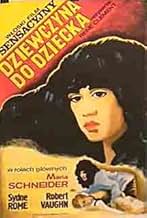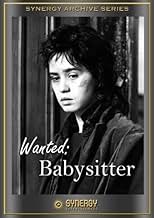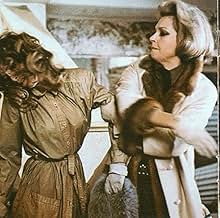A naive young girl is forcefully kidnapped while babysitting the son of a wealthy food mogul; she and the boy are held hostage by an ex-stuntman and a vengeful movie star.A naive young girl is forcefully kidnapped while babysitting the son of a wealthy food mogul; she and the boy are held hostage by an ex-stuntman and a vengeful movie star.A naive young girl is forcefully kidnapped while babysitting the son of a wealthy food mogul; she and the boy are held hostage by an ex-stuntman and a vengeful movie star.
Carl Möhner
- Cyrus Franklin
- (as Karl Mohner)
Maria Cumani Quasimodo
- Princess Ruspini
- (uncredited)
Margherita Horowitz
- Maid
- (uncredited)
Featured reviews
This film was almost universally panned at the time of its release. It was the final film of distinguished French director Rene' Clement and clearly not one of his best. But....
There is something about this film that is quite compelling. Agreed, the plot is full of holes and certainly stretches belief and logic. But there is a melancholy mood that few films ever achieve. One has to credit Clement for this (non-trivial) achievement. Generating and communicating melancholia is hard to do and somehow Clement manages it.
Credit must also go to French actress Maria Schneider who plays the role of the confused and trapped Michelle, just right. Her acting is minimalistic, and ultimately believable. In a smaller role, Italian comedian Renato Pozzetto, playing the scruffy Gianni ( Michelle's friend), brings just the right seediness, innocence and melancholy to his scenes. Worth a look. Worth a partial revaluation.
There is something about this film that is quite compelling. Agreed, the plot is full of holes and certainly stretches belief and logic. But there is a melancholy mood that few films ever achieve. One has to credit Clement for this (non-trivial) achievement. Generating and communicating melancholia is hard to do and somehow Clement manages it.
Credit must also go to French actress Maria Schneider who plays the role of the confused and trapped Michelle, just right. Her acting is minimalistic, and ultimately believable. In a smaller role, Italian comedian Renato Pozzetto, playing the scruffy Gianni ( Michelle's friend), brings just the right seediness, innocence and melancholy to his scenes. Worth a look. Worth a partial revaluation.
What a cast! Maria Schneider, Sydne Rome, two absolute beauties, Nadja Tiller, another beauty, Vic Morrow, Robert Vaughn and the unique Renato Pozzetto, who kind of steals the film with his role of an involuntary comic, excellently played by the actor. The story is trivial, the kidnapping of a boy for a ransom. The implications between the characters are interesting though. Worth seeing especially for Maria Schneider and Renato Pozzetto.
A young woman (Maria Schneider)is lured to a babysitting gig in a remote mansion by her treacherous roommate (Sydney Rome). When her young charge wakes up though, she realizes that he's been kidnapped and that she's being used as an unwitting front in the kidnapping. This movie was directed by a respected French director, Rene Clement, and is in black and white for some reason. It is a rather ridiculous melodrama, however, that doesn't really live up to its arty pretensions. On the other hand, people drawn in by its exploitative English title, "Wanted: Babysitter" ( I only understand the "jeun fille" part of the French title, but it seems pretty exploitative too) were probably pretty disappointed at its relative lack of exploitative elements. It was probably mistaken by many for one of the "sexy babysitter" movies of the era (i.e. "The Babysitter", "Weekend with the Babysitter", "Jailbait Babysitter", ad infinitum), especially with the Maria "Last Tango in Paris' Schneider in the lead.
I actually kind of like movies like this though that fall in the no-man's land between art and exploitation. The absurd plot kind of reminded me of an Italian giallo (although it's slow and subtle in a French way rather than delirious and over-the-top in an Italian). Regrettably--nay, tragically--Schneider has no nude scenes, but she's still pretty good. This is actually the third best movie I've seen her in after "Last Tango" and "The Passenger" (. . .well, actually I've only seen her in those two other movies). Rome does have nude scenes, and, surprisingly, she too is pretty good (I found her sexy but incredibly annoying in Polanski's "What?" and just plain irritating in the Italian anthology "Sex with a Smile").
This is a pretty unusual movie which I wouldn't recommend to everybody, but if it sounds interesting to you . . .
I actually kind of like movies like this though that fall in the no-man's land between art and exploitation. The absurd plot kind of reminded me of an Italian giallo (although it's slow and subtle in a French way rather than delirious and over-the-top in an Italian). Regrettably--nay, tragically--Schneider has no nude scenes, but she's still pretty good. This is actually the third best movie I've seen her in after "Last Tango" and "The Passenger" (. . .well, actually I've only seen her in those two other movies). Rome does have nude scenes, and, surprisingly, she too is pretty good (I found her sexy but incredibly annoying in Polanski's "What?" and just plain irritating in the Italian anthology "Sex with a Smile").
This is a pretty unusual movie which I wouldn't recommend to everybody, but if it sounds interesting to you . . .
This movie’s BOMB rating in the Leonard Maltin Film Guide seemed to justify distinguished French director Clement’s bowing out of the industry at the relatively early age of 62 (after all, he would go on to live for another 21 years); though admittedly clumsily constructed at times, it’s hardly such an embarrassing mess that would lead a renowned film-maker to become suddenly unbankable!
The bizarre and eclectic international cast is, in itself, quite notable: Maria Schneider, Sydne Rome, Vic Morrow, Robert Vaughn, Nadja Tiller, Renato Pozzetto and Carl Mohner; THE BABYSITTER, in fact, was an Italian-French-German co-production – albeit filmed in English – from Italian movie mogul Carlo Ponti’s stable. While it’s the Americans (Rome, Morrow and Vaughn) who truly make the film, the contributions of Schneider and Pozzetto (both of whom seemed particular liabilities for Maltin!) are hardly negligible or jarring (Schneider’s haunted, disheveled look by the end of it – having been assaulted by Morrow who, in his fury, took a knife to her hair! – and Pozzetto’s surreal ramble to Morrow himself about the apocalyptic inevitability of two-headed insects and radioactive mozzarella bear witness to this). The stunning Rome has a couple of brief, frank nude scenes (one of them at the very start of the film) but, surprisingly enough, Schneider doesn’t (her rebellious and self-destructive nature, which got the actress famously sacked from Luis Bunuel’s THAT OBSCURE OBJECT OF DESIRE [1977], would soon spell the end for her meteoric stardom); incidentally, the two characters meet when Rome is hit by a taxi in which Schneider is a passenger – and the two later decide to shack up together!
Rome, Morrow, Vaughn and Tiller are all down-on-their-luck actors involved in a complex kidnapping scheme actually inspired by Schneider’s titular line of work: in fact, Rome impersonates the latter at the villa belonging to a former conquest – an American industrialist – who had jilted her (the whole, then, is organized by the man’s very own unscrupulous lawyer!); a gruff Morrow doubles as a telephone-repair man in order to move about inconspicuously in the neighborhood of the designated premises, while the customarily brooding Vaughn lends a definite camp factor to the proceedings. Schneider, who’s an unwitting victim here, and the industrialist’s boy start off on the wrong foot (since Rome had mistreated and even drugged him so that he can be transported to an empty house in the suburbs) – but they eventually bond and, by the end, the kid (named Boots!) doesn’t want to leave her side; incidentally, Morrow is forced to kill an elderly neighbor whom Schneider had tried to contact.
Pozzetto, Schneider’s boyfriend, won’t rest on his laurels – also because he gave her the key to his apartment!; somehow, he manages to locate the house but is scared off by Morrow in the above-mentioned scene they share (it was certainly weird seeing the popular, chubby Italian comic interacting with the likes of him and Vaughn) – the film, then, ends on an agreeably amusing note as Pozzetto decides to call in a professional with a passkey to his home (arriving on the scene loaded with them) but, by this time, Schneider’s come back! By the way, the greedy lawyer decides to keep the ransom money all for himself and eliminates Vaughn and Tiller (a scene witnessed by Schneider and the boy); when Morrow turns up, she tells him he’s been duped and he leaves, disconcerted – after which Schneider calls the police to denounce the lawyer’s involvement in the case…
For the record, Clement started out with the famous WWII semi-documentary LA BATAILLE DU RAIL (1945) and proceeded to such Art-house hits as FORBIDDEN GAMES (1952) and GERVAISE (1956); however, after introducing Alain Delon in the excellent Patricia Highsmith adaptation PLEIN SOLEIL (1960), he seemed stuck in a rut of pulp thrillers right till the end of his career – JOY HOUSE (1964), RIDER ON THE RAIN (1970), THE DEADLY TRAP (1971), AND HOPE TO DIE (1972), etc. Incidentally, the film under review had been shown on late-night Italian TV a number of times in the past – but it was only now, still moved by the footage of Morrow’s horrific death, that I decided to check it out…and for which I was glad since, while essentially unsatisfying, it clearly turned out to be of more than passing interest.
The bizarre and eclectic international cast is, in itself, quite notable: Maria Schneider, Sydne Rome, Vic Morrow, Robert Vaughn, Nadja Tiller, Renato Pozzetto and Carl Mohner; THE BABYSITTER, in fact, was an Italian-French-German co-production – albeit filmed in English – from Italian movie mogul Carlo Ponti’s stable. While it’s the Americans (Rome, Morrow and Vaughn) who truly make the film, the contributions of Schneider and Pozzetto (both of whom seemed particular liabilities for Maltin!) are hardly negligible or jarring (Schneider’s haunted, disheveled look by the end of it – having been assaulted by Morrow who, in his fury, took a knife to her hair! – and Pozzetto’s surreal ramble to Morrow himself about the apocalyptic inevitability of two-headed insects and radioactive mozzarella bear witness to this). The stunning Rome has a couple of brief, frank nude scenes (one of them at the very start of the film) but, surprisingly enough, Schneider doesn’t (her rebellious and self-destructive nature, which got the actress famously sacked from Luis Bunuel’s THAT OBSCURE OBJECT OF DESIRE [1977], would soon spell the end for her meteoric stardom); incidentally, the two characters meet when Rome is hit by a taxi in which Schneider is a passenger – and the two later decide to shack up together!
Rome, Morrow, Vaughn and Tiller are all down-on-their-luck actors involved in a complex kidnapping scheme actually inspired by Schneider’s titular line of work: in fact, Rome impersonates the latter at the villa belonging to a former conquest – an American industrialist – who had jilted her (the whole, then, is organized by the man’s very own unscrupulous lawyer!); a gruff Morrow doubles as a telephone-repair man in order to move about inconspicuously in the neighborhood of the designated premises, while the customarily brooding Vaughn lends a definite camp factor to the proceedings. Schneider, who’s an unwitting victim here, and the industrialist’s boy start off on the wrong foot (since Rome had mistreated and even drugged him so that he can be transported to an empty house in the suburbs) – but they eventually bond and, by the end, the kid (named Boots!) doesn’t want to leave her side; incidentally, Morrow is forced to kill an elderly neighbor whom Schneider had tried to contact.
Pozzetto, Schneider’s boyfriend, won’t rest on his laurels – also because he gave her the key to his apartment!; somehow, he manages to locate the house but is scared off by Morrow in the above-mentioned scene they share (it was certainly weird seeing the popular, chubby Italian comic interacting with the likes of him and Vaughn) – the film, then, ends on an agreeably amusing note as Pozzetto decides to call in a professional with a passkey to his home (arriving on the scene loaded with them) but, by this time, Schneider’s come back! By the way, the greedy lawyer decides to keep the ransom money all for himself and eliminates Vaughn and Tiller (a scene witnessed by Schneider and the boy); when Morrow turns up, she tells him he’s been duped and he leaves, disconcerted – after which Schneider calls the police to denounce the lawyer’s involvement in the case…
For the record, Clement started out with the famous WWII semi-documentary LA BATAILLE DU RAIL (1945) and proceeded to such Art-house hits as FORBIDDEN GAMES (1952) and GERVAISE (1956); however, after introducing Alain Delon in the excellent Patricia Highsmith adaptation PLEIN SOLEIL (1960), he seemed stuck in a rut of pulp thrillers right till the end of his career – JOY HOUSE (1964), RIDER ON THE RAIN (1970), THE DEADLY TRAP (1971), AND HOPE TO DIE (1972), etc. Incidentally, the film under review had been shown on late-night Italian TV a number of times in the past – but it was only now, still moved by the footage of Morrow’s horrific death, that I decided to check it out…and for which I was glad since, while essentially unsatisfying, it clearly turned out to be of more than passing interest.
I was not disappointed by this last René Clément's film. It's an international cast, as he did for LA COURSE DU LIEVRE A TRAVERS LES CHAMPS, a couple of years earlier. Not a bad movie which the topic reminded me Yves Boisset's FOLLE A TUER. The nanny and the wealthy kid about to be abducted. Not a masterpiece but certainly not a garbage movie. You would not find such features now. Yes, it's a typical downbeat scheme, as we often saw forty years ago, especially from France. And not only. Good performances too, despite the fact that there was no great actors in the cast. It's also a rather rare film, hard to find and no often released even on French channels.
I love watching such movies from time to time, gloomy and so sad.
I love watching such movies from time to time, gloomy and so sad.
Did you know
- TriviaRené Clément's final film at age 62, although he would live another 21 years; he also co-wrote it.
- How long is Wanted: Babysitter?Powered by Alexa
Details
- Release date
- Countries of origin
- Language
- Also known as
- Jeune fille libre le soir
- Production companies
- See more company credits at IMDbPro
- Runtime
- 1h 50m(110 min)
- Sound mix
Contribute to this page
Suggest an edit or add missing content




















